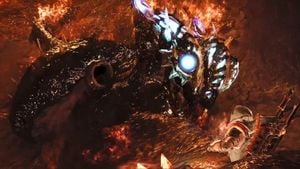The trial of Hadi Matar, the man accused of repeatedly stabbing renowned author Salman Rushdie, began on February 10, 2024, at Chautauqua County Court, Mayville, New York. Matar, 27, from New Jersey, faces significant charges, including attempted murder and assault, related to the incident during a lecture event at the Chautauqua Institution on August 12, 2022. He has pleaded not guilty to all charges and remains detained as proceedings continue.
During the opening statements, lead prosecutor Jason Schmidt described the rapid and brutal attack on Rushdie, who was preparing to speak on the subject of safety for writers. Schmidt informed the jury of the harrowing details, stating, "Without hesitation, upon reaching Mr. Rushdie, this man ... plunged the knife ... over and over again." The courtroom was filled with anticipation as jurors learned more about the events of the day—when Matar allegedly stormed the stage armed with a knife, stabbing Rushdie about 15 times, including injuries to the neck, stomach, and right eye, the latter leaving Rushdie partially blind.
Rushdie, 77, had been under threat for decades, ever since the fatwa issued against him by Iran's Ayatollah Khomeini following the publication of his controversial novel, The Satanic Verses, which many Muslims deemed blasphemous. Prior to the attack, Rushdie maintained some sense of normalcy, expressing to journalists he felt relatively safe after years of living under police protection.
Schmidt's opening argument highlighted how close Matar came to successfully murdering Rushdie. He depicted the attack as swift and purposeful, illustrating how bystanders rushed to subdue Matar immediately after he struck. "The suddenness of the attack ... came so unexpectedly ... Even the person under attack ... didn’t even register immediately what was happening," Schmidt explained.
Along with Rushdie, Henry Reese, the moderator of the event, sustained injuries during this shocking episode. Witnesses were reportedly traumatized as they witnessed the rapid escalation from the beginning of Rushdie’s introduction to the moment when chaos unleashed.
Rushdie's injuries have been catastrophic; he not only lost vision but also suffered nerve damage and liver damage as well. He has spent months recovering and documented his ordeal and reflections on the attack in his memoir, Knife: Meditations After an Attempted Murder, where he muses on what he might say to Matar, writing poignant thoughts like, "I find I have very little to say to you. Our lives touched each other for an instant and then separated. Mine has improved since than, yours has deteriorated. You made a bad gamble and lost."
Matar, on the other hand, voiced possible motivations following his alleged actions. Reports indicated he mentioned admiration for Khomeini, but he claimed to have only read parts of The Satanic Verses. His remarks during his arrest suggested possible ideological influences, as he affirmatively stated, "Free Palestine" as he was led to the courtroom, sparking discussions about broader political contexts and motivations.
During the trial proceedings, Matar's defense attorney, Lynn Schaffer, raised doubts about the prosecution’s characterization of the events leading up to the attack. "This is not a whodunnit mystery. It's not an Agatha Christie novel," she stated, highlighting gaps the defense believed existed within the prosecutor's narrative. Schaffer asserted the notion of premeditated intent to harm is complex, mentioning Matar's purchase of tickets as indicative of benign intentions at first.
Though Matar is facing serious state charges, he is also dealing with pending federal accusations related to terrorism, which involve claims of maintaining ties to Hezbollah, designated by the U.S. as a terrorist organization. The circumstances surrounding Matar's actions and the trial have reignited discussions about freedom of expression under threat, especially as Rushdie's attack unfolded against the backdrop of decades of hostility linked to his literary work.
The trial is expected to last approximately one week, during which jurors will view video evidence, hear testimonies from witnesses, including Rushdie himself, and witness accounts from law enforcement present during the incident. With each passing day, the case seeks to address the complex intersection of ideology, art, and violence.
Capping the day’s testimony, Schmidt reiterated to the jury the serious nature of the crime, asserting, "Matar came dangerously close to committing murder," as technically defined within the framework of law. The community, still shaken from the event, watches with bated breath as one of the literary world's most storied figures confronts the man who tried to end his life.
At its core, this trial illuminates the vulnerabilities authors face, particularly those who, like Rushdie, have chosen to challenge popular narratives and convene dialogue through literature. Outside the confines of the courtroom, writers everywhere are reminded of the risks associated with the freedoms they seek to uphold. The stakes are high and the eyes of the world remain fixed on Mayville, New York, where justice is being sought, not just for Rushdie, but for the principles of free speech itself.



